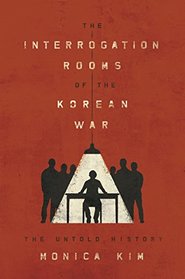Search -
The Interrogation Rooms of the Korean War: The Untold History
The Interrogation Rooms of the Korean War The Untold History
Author:
A groundbreaking look at how the interrogation rooms of the Korean War set the stage for a new kind of battle?not over land but over human subjectsTraditional histories of the Korean War have long focused on violations of the thirty-eighth parallel, the line drawn by American and Soviet officials in 1945 dividing the Korean peninsula. But The In... more »
Author:
A groundbreaking look at how the interrogation rooms of the Korean War set the stage for a new kind of battle?not over land but over human subjectsTraditional histories of the Korean War have long focused on violations of the thirty-eighth parallel, the line drawn by American and Soviet officials in 1945 dividing the Korean peninsula. But The In... more »
ISBN-13: 9780691166223
ISBN-10: 0691166226
Publication Date: 2/5/2019
Pages: 452
Edition: First Edition
Rating: ?
ISBN-10: 0691166226
Publication Date: 2/5/2019
Pages: 452
Edition: First Edition
Rating: ?
0 stars, based on 0 rating
Publisher: Princeton University Press
Book Type: Hardcover
Members Wishing: 1
Reviews: Amazon | Write a Review
Book Type: Hardcover
Members Wishing: 1
Reviews: Amazon | Write a Review
Genres:
- History >> Americas >> United States
- History >> Asia >> Southeast Asia
- History >> Asia >> Korea >> South
- History >> Military >> Korean War
- History >> Military >> Strategy
- History >> World
- Uncategorized >> International & World Politics >> Asian
- Politics & Social Sciences >> Politics & Government >> Propaganda & Political Psychology




